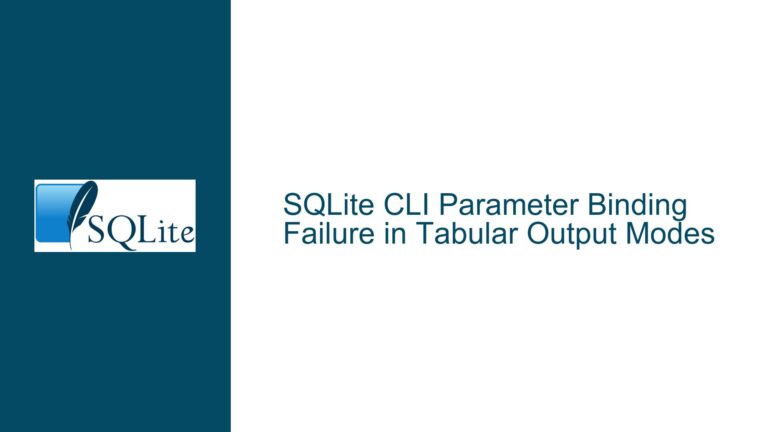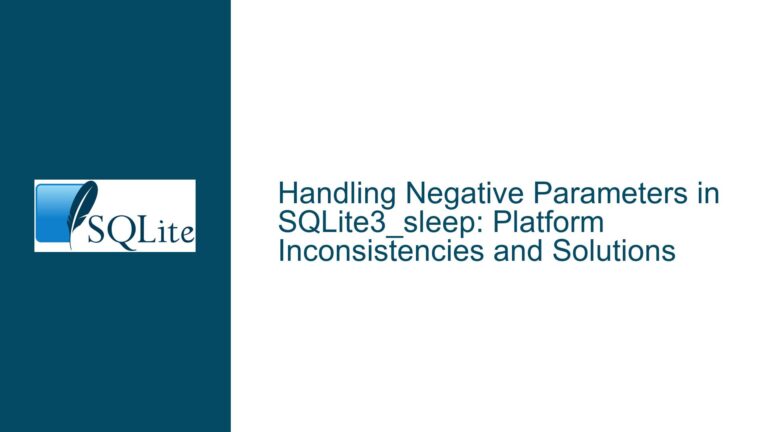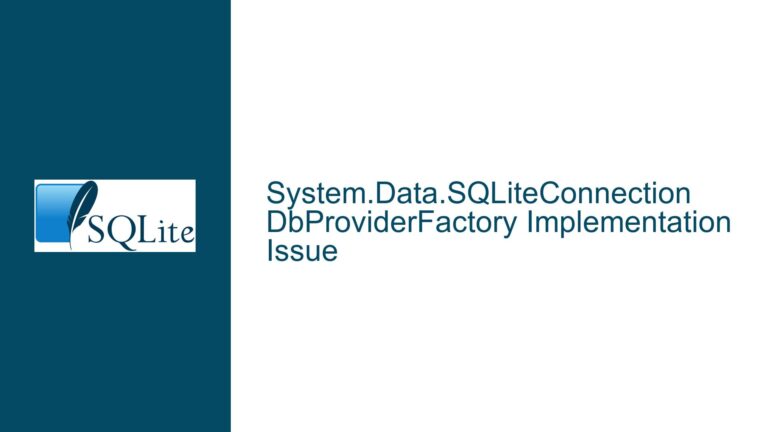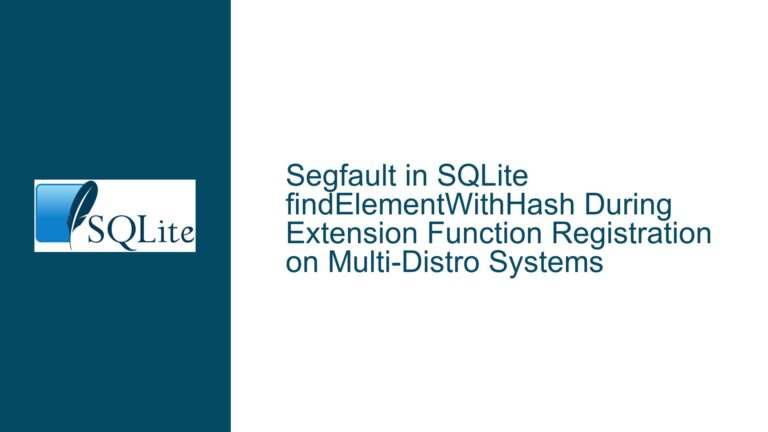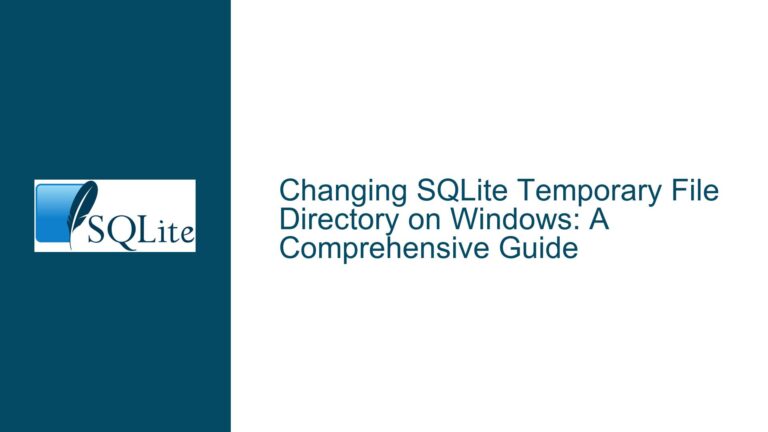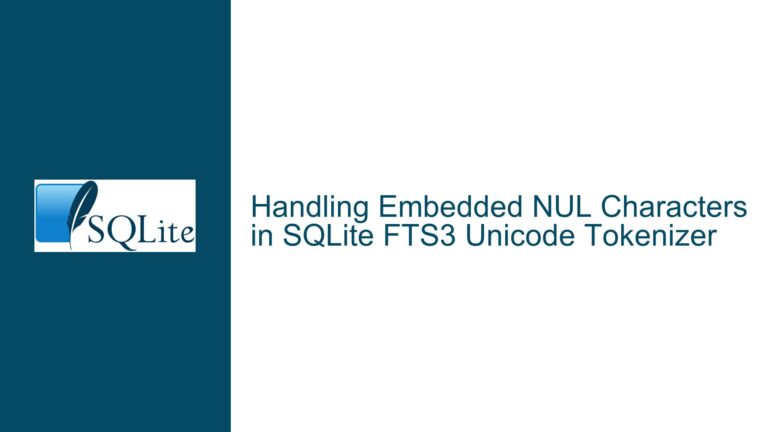Naming Conventions and Cross-Platform Extension Loading in SQLite
Issue Overview: SQLite’s load_extension() Search Heuristics and Cross-Platform Naming Conventions
The core issue revolves around SQLite’s load_extension() function and its inability to handle cross-platform naming conventions for dynamically loaded extension libraries. Specifically, the function does not account for the common Unix/Linux naming convention where shared libraries are prefixed with lib. For example, while a shared library on Windows might be named Foo.dll, its Unix/Linux counterpart is typically named libFoo.so. SQLite’s load_extension() function, however, only attempts to load Foo.so on Unix/Linux systems, ignoring the lib prefix. This creates a significant hurdle for developers aiming to write cross-platform SQL scripts that load extensions without resorting to platform-specific conditional logic.
The problem is further compounded by the fact that the naming conventions for shared libraries are deeply ingrained in build systems and package management tools. For instance, CMake, a widely used build system, automatically generates shared library names with the lib prefix on Unix/Linux systems. This means that developers who rely on such build systems have little control over the final names of the shared libraries. As a result, they are forced to either rename the libraries manually—which is often impractical—or find workarounds to load the libraries using SQLite’s current search heuristics.
The issue is not merely a matter of convenience; it has practical implications for maintaining cross-platform compatibility in SQL scripts. Without a solution, developers must either write platform-specific SQL scripts or resort to external scripting to conditionally load the correct library name based on the operating system. Both approaches undermine the goal of writing clean, maintainable, and portable SQL code.
Possible Causes: Why SQLite’s load_extension() Function Behaves This Way
The behavior of SQLite’s load_extension() function can be traced back to its design philosophy and the historical context of shared library naming conventions. SQLite is designed to be a lightweight, self-contained database engine with minimal dependencies. As such, its extension loading mechanism is intentionally simple and does not include complex search heuristics or platform-specific logic. The function assumes that the library name provided by the developer is the exact name of the shared library file, without any additional prefixes or suffixes.
This design choice aligns with SQLite’s goal of being easy to embed and deploy across different platforms. However, it also means that the function does not account for the varying naming conventions used by different operating systems. On Windows, shared libraries typically have a .dll extension, while on Unix/Linux systems, they usually have a .so extension and are prefixed with lib. SQLite’s load_extension() function does not automatically adapt to these conventions, leading to the issue at hand.
Another contributing factor is the lack of a standardized naming convention for shared libraries across different programming languages and ecosystems. While the lib prefix is common in C/C++ projects on Unix/Linux systems, other languages and frameworks may use different conventions. For example, Python extensions typically use a .pyd extension on Windows and a .so extension on Unix/Linux, without the lib prefix. SQLite’s extension loading mechanism does not attempt to accommodate these variations, as doing so would introduce additional complexity and potential edge cases.
Finally, the issue is exacerbated by the fact that SQLite’s extension loading mechanism is primarily designed for dynamically loaded extensions, rather than statically linked ones. In the case of statically linked extensions, the library name is often irrelevant, as the extensions are compiled directly into the SQLite binary. However, when dynamically loaded extensions are used, the library name becomes critical, and the lack of support for common naming conventions can create significant challenges for developers.
Troubleshooting Steps, Solutions & Fixes: Addressing the Cross-Platform Extension Loading Issue
To address the issue of cross-platform extension loading in SQLite, developers have several options, each with its own trade-offs. The most straightforward solution is to modify the SQLite source code to enhance the load_extension() function’s search heuristics. This would involve adding support for the lib prefix on Unix/Linux systems, allowing the function to attempt loading both Foo.so and libFoo.so. While this approach would provide a seamless solution for developers, it requires modifying the SQLite source code, which may not be feasible for all projects.
Another option is to use a wrapper function or script to handle the platform-specific logic for loading extensions. For example, developers could write a custom SQL function or shell script that determines the operating system and constructs the appropriate library name before calling load_extension(). This approach allows developers to maintain a single-source SQL script while still accommodating different naming conventions. However, it introduces additional complexity and may not be suitable for all use cases.
A third option is to leverage SQLite’s sqlite3_auto_extension() function to automatically register statically linked extensions at runtime. This approach eliminates the need to load extensions dynamically, as the extensions are compiled directly into the SQLite binary. While this solution works well for statically linked extensions, it is not applicable to dynamically loaded extensions, which are the focus of this issue.
For developers who cannot modify the SQLite source code or use statically linked extensions, the most practical solution is to adopt a consistent naming convention for shared libraries across all platforms. This may involve renaming the libraries manually or modifying the build system to generate the desired names. While this approach requires some upfront effort, it ensures that the load_extension() function can load the libraries without any additional logic.
In cases where renaming the libraries is not feasible, developers can use symbolic links or aliases to create platform-specific names for the shared libraries. For example, on a Unix/Linux system, a symbolic link named Foo.so can be created to point to libFoo.so. This allows the load_extension() function to load the library using the expected name, without requiring any changes to the SQLite source code or the build system.
Finally, developers can consider using a higher-level scripting language or framework to manage the loading of SQLite extensions. For example, a Python script could determine the operating system, construct the appropriate library name, and execute the necessary SQL commands to load the extension. This approach provides maximum flexibility and allows developers to handle complex scenarios, but it also introduces additional dependencies and complexity.
In conclusion, while SQLite’s load_extension() function does not natively support cross-platform naming conventions for shared libraries, developers have several options to address this issue. The best solution depends on the specific requirements and constraints of the project, but with careful planning and implementation, it is possible to achieve seamless cross-platform extension loading in SQLite.

